As cat owners, ensuring our feline companions maintain a healthy weight is a crucial aspect of their overall well-being. Understanding what constitutes an average weight for a cat can provide valuable insights into their health status.
Factors such as breed, age, and lifestyle play a significant role in determining whether a cat is within the healthy weight range. By exploring the nuances of cat weight guidelines and the implications of weight fluctuations, cat owners can take proactive steps to promote their cats' health and longevity.
Key Takeaways
- Average adult cats weigh around 11 pounds, but weight varies based on breed and lifestyle.
- Over 50% of cats in North America are overweight, increasing the risk of health issues.
- Regularly monitor your cat's weight and body condition to prevent obesity or underweight issues.
- Consult a veterinarian for weight management plans if your cat is overweight or experiencing unexplained weight loss.
Average Weight Guidelines for Cats
In determining the average weight guidelines for cats, various factors such as breed, age, and lifestyle play significant roles. Female cats' weight can vary widely depending on these factors.
Healthy adult male and female cats typically weigh around 11 pounds, but this can vary greatly. For example, Maine Coon cats can weigh up to 20 pounds, while Himalayan cats may be as small as 7 pounds.
It's essential to monitor your cat's weight and body condition regularly, especially during the early growth stages and throughout adulthood. By keeping an eye on your cat's weight and making any necessary adjustments to their diet and exercise routine, you can help ensure they maintain a healthy weight for their breed and age.
Factors Affecting Female Cats' Weight
Factors influencing the weight of female cats encompass a range of elements, including breed-specific characteristics, age-related changes, and lifestyle factors that collectively contribute to their overall body mass. Different cat breeds have varying predispositions towards weight, with Maine Coons potentially reaching up to 20 pounds and Himalayans averaging around 7 pounds.
As female cats age, their metabolism and activity levels may shift, affecting their weight. Additionally, factors like diet, exercise, and overall health can play a significant role in determining a female cat's weight. Understanding these diverse influences can help cat owners make informed decisions about their feline companions' well-being and ensure they maintain a healthy weight throughout their lives.
Typical Weight for Healthy Cats
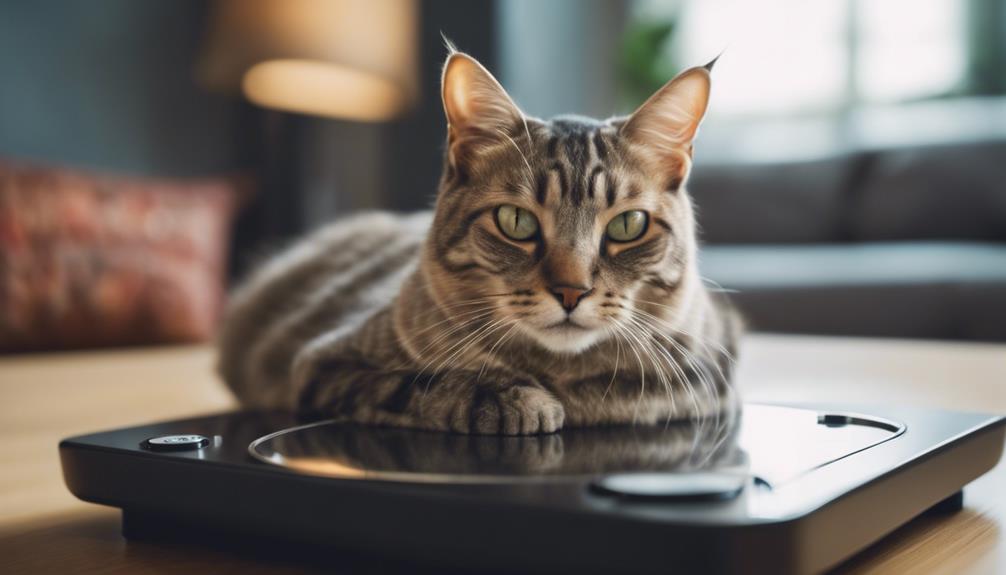
Healthy cats typically maintain a stable weight of around 11 pounds, with variations based on breed, age, and lifestyle factors. This weight range serves as a general guideline for determining the health and well-being of your feline companion.
While individual cats may fall slightly above or below this average, regular monitoring of weight fluctuations can help ensure your cat remains within a healthy range. Factors such as muscle mass, body shape, and overall size can influence what is considered an ideal weight for a particular cat.
Variances in Breed Weights
When considering the weight of cats, one must acknowledge the significant variations that exist among different breeds. These variations can range from the slender Siamese cat, typically weighing around 8 to 12 pounds, to the robust Maine Coon cat, which can weigh up to 20 pounds or more.
Breeds like the Sphynx or Cornish Rex tend to be on the lighter side, averaging between 6 to 10 pounds, while the British Shorthair can weigh anywhere from 9 to 18 pounds. Understanding these breed-specific differences is essential when evaluating your cat's weight and overall health.
Consult with your veterinarian to determine the ideal weight range for your cat's specific breed.
Weight Development in Kittens
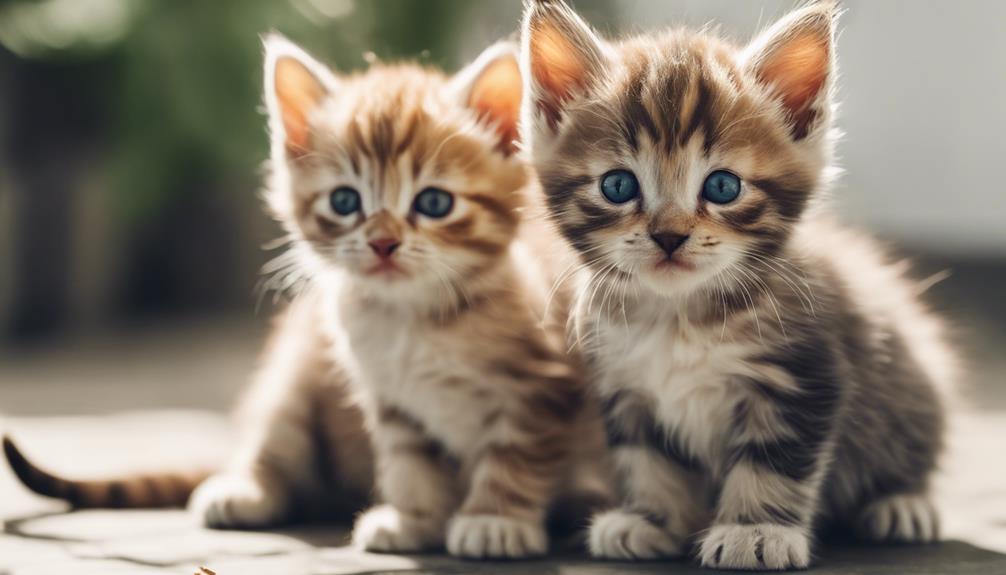
Understanding the weight development in kittens is crucial for ensuring their proper growth and overall well-being, particularly considering the significant variations in breed weights previously discussed. Kittens undergo rapid growth in their first few months, doubling or even tripling their weight by the time they are 4 months old.
During this period, it's essential to monitor their weight regularly to ensure they are developing at a healthy rate. Factors such as genetics, diet, and overall health can influence a kitten's weight development. By tracking their weight closely and consulting with a veterinarian if there are concerns, pet owners can help their kittens grow into healthy adult cats.
It's also important to remember that each kitten grows at its own pace, so individual variations in weight development should be taken into account.
Importance of Body Condition Scoring
Monitoring a cat's body condition through scoring is essential for assessing its overall health and well-being. Body condition scoring involves evaluating factors such as fat cover, muscle tone, and overall appearance to determine if a cat is underweight, overweight, or at an ideal weight.
This process helps in identifying any potential health issues and allows for timely intervention if needed. Some key points to consider about body condition scoring include:
- It provides a more comprehensive assessment than just looking at weight alone.
- Helps in tailoring a suitable diet and exercise plan for the cat.
- Enables early detection of weight-related health problems.
- Regular scoring can help track changes in the cat's body condition over time.
Monitoring Weight Changes
Body condition scoring in cats is a crucial tool for evaluating their overall health, including weight management, and leads to timely intervention when necessary. Regularly monitoring your cat's weight and body condition is essential.
Keep an eye on any significant weight changes, especially in kittens, as their early growth stages are vital for tracking proper development. Sudden weight loss or gain should prompt a visit to the veterinarian to rule out any underlying health issues.
Significance of Early Growth Stages
During the early growth stages of kittens, careful observation and timely intervention are paramount for ensuring their optimal development and health.
- Regular Weigh-ins: Weigh kittens regularly to track their growth progress accurately.
- Balanced Nutrition: Provide a well-balanced diet tailored to their specific growth needs.
- Veterinary Check-ups: Schedule regular vet visits to monitor their overall health and development.
- Socialization: Encourage social interaction and playtime to support their mental and physical well-being.
Prevalence of Feline Obesity
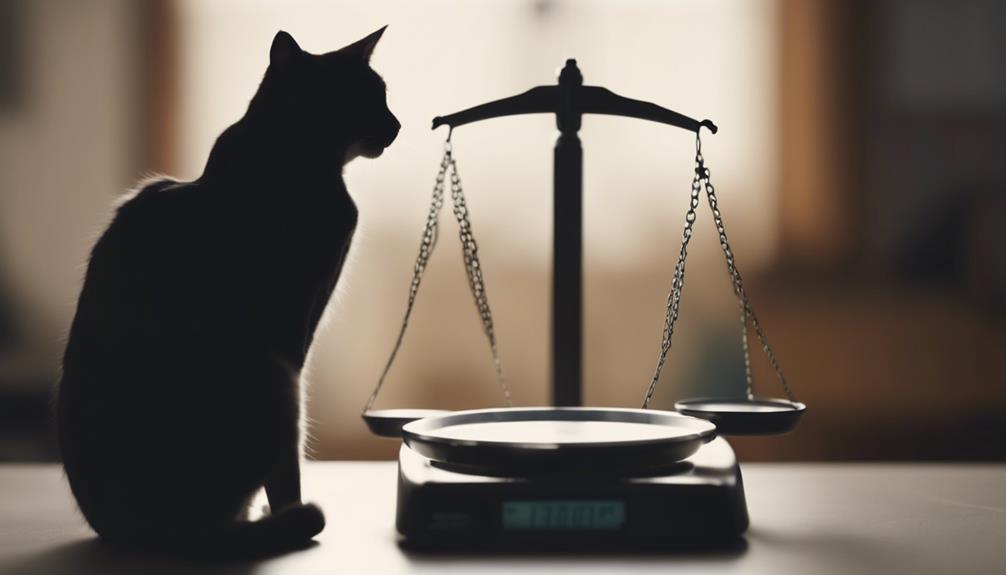
The prevalence of feline obesity is a growing concern in the veterinary community, posing significant health risks for cats. Over 50% of cats in North America are overweight, indicating a widespread issue that demands attention.
Obesity in cats can lead to serious conditions such as diabetes and other illnesses, impacting their overall well-being and longevity. Veterinarians play a crucial role in creating personalized weight management plans to address this issue effectively.
Mobility problems and orthopedic conditions can worsen due to excess weight, further emphasizing the importance of maintaining a healthy weight in cats. By being proactive and vigilant about monitoring and managing their weight, cat owners can help prevent the adverse effects of obesity on their feline companions.
Risks of Cat Obesity
What are the potential health consequences of obesity in cats, and how do they impact their overall well-being and longevity?
Obesity in cats can lead to various health risks that affect their quality of life and lifespan. Some of the key consequences include:
- Increased risk of diabetes
- Joint and mobility issues
- Heart and respiratory problems
- Decreased immune function
These conditions can significantly impact a cat's well-being, making it essential to maintain a healthy weight through proper diet and exercise. Being mindful of your cat's weight can help prevent these risks and ensure a long and happy life for your feline companion.
Veterinarian Weight Management Plans
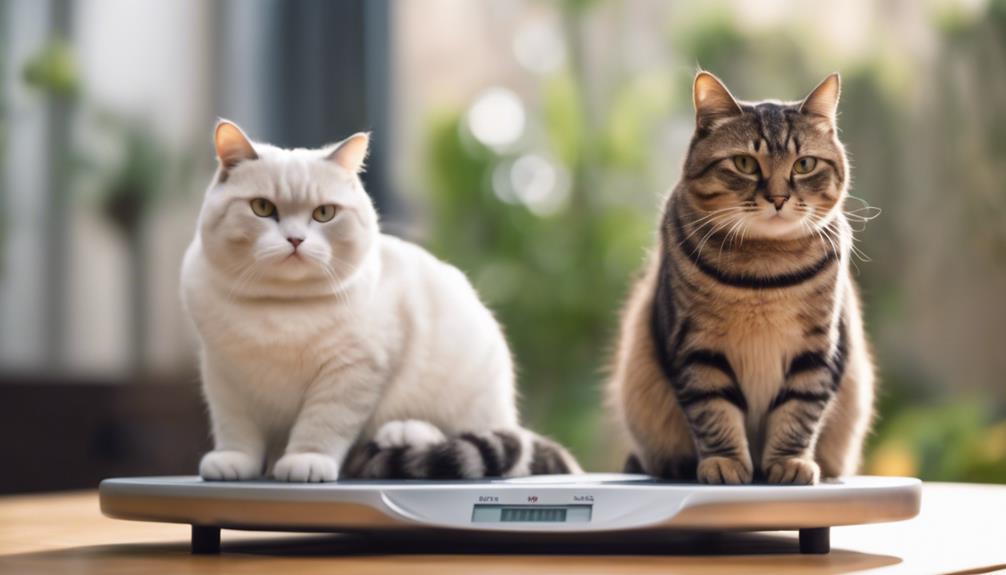
Veterinarian weight management plans play a crucial role in addressing and mitigating obesity in cats, focusing on tailored strategies to promote healthy weight loss and overall well-being. These plans are designed to help cats achieve their ideal weight gradually and safely. Here is an example of what a veterinarian weight management plan may include:
| Component | Description | Benefits |
|---|---|---|
| Dietary Recommendations | Customized meal plans to control calorie intake | Promotes healthy weight loss |
| Exercise Guidelines | Specific exercise routines tailored to the cat's needs | Improves overall fitness |
| Regular Monitoring | Scheduled check-ins to track progress and adjust plan | Ensures steady weight management |
Impact of Excess Weight on Mobility
Excess weight in cats can significantly impair their mobility, affecting their overall quality of life.
- Cats may struggle to jump onto furniture or high surfaces.
- Joint pain and arthritis can develop due to the added weight.
- Playing and exercising may become challenging for overweight cats.
- Mobility issues can lead to a decrease in overall activity levels and lethargy.
Approaches for Gradual Weight Loss
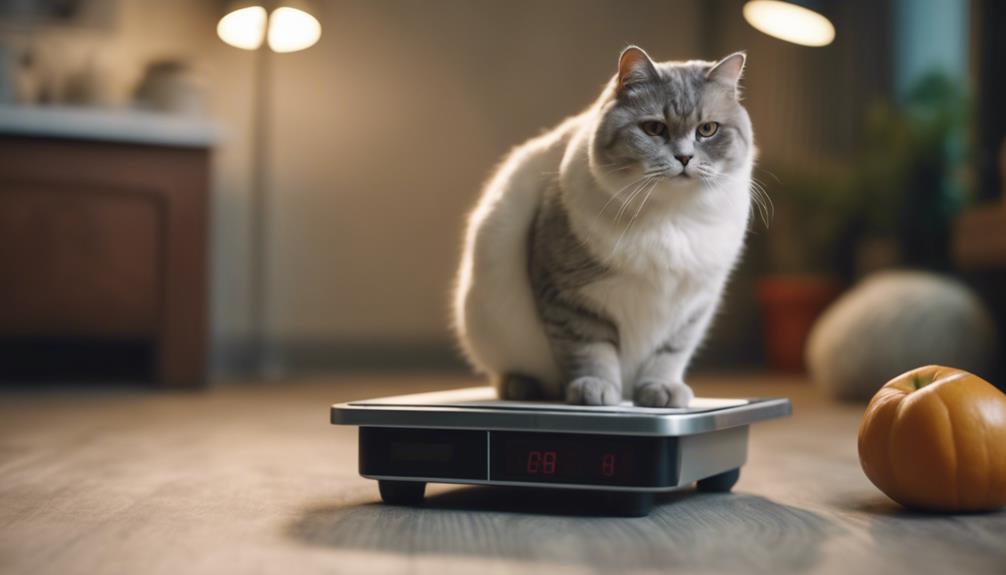
When addressing overweight cats, the recommended approaches for achieving gradual weight loss while ensuring their overall well-being involve a combination of diet modifications and increased physical activity. Consulting with your veterinarian is crucial to create a tailored weight loss plan that considers your cat's specific needs. This plan may include switching to a high-protein, low-carbohydrate diet to promote satiety while reducing calorie intake.
Moreover, incorporating interactive toys or scheduled play sessions can encourage your cat to be more active. It's important to remember that gradual weight loss is essential to prevent health complications. Therefore, be patient and consistent in implementing these changes to support your cat's journey towards a healthier weight.
Addressing Sudden Weight Loss
Sudden weight loss in cats can be indicative of underlying health issues that require prompt attention for effective management. If you notice your cat losing weight rapidly, it's essential to consult a veterinarian to rule out any serious conditions. Here are some key points to consider:
- Monitor Food Intake: Keep track of your cat's eating habits and appetite changes.
- Check for Behavioral Changes: Look for any unusual behaviors that might indicate discomfort or illness.
- Schedule a Veterinary Visit: Seek professional help to diagnose the root cause of sudden weight loss.
- Follow Treatment Plans: Adhere to the veterinarian's recommendations for addressing the weight loss issue promptly.
Importance of Veterinary Attention
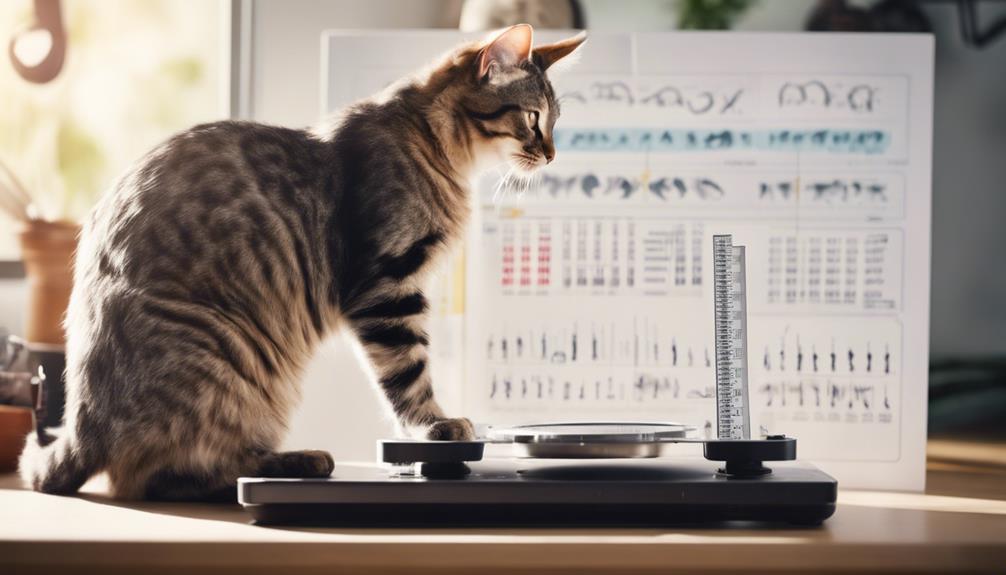
Seeking timely veterinary attention is crucial for maintaining the health and well-being of cats experiencing weight-related issues. Cats are masters at hiding signs of illness, making regular check-ups essential for detecting weight fluctuations early on. A veterinarian can conduct thorough examinations and recommend appropriate dietary and exercise plans tailored to your cat's specific needs.
Prompt veterinary attention is especially vital for addressing sudden weight loss, as it can be a red flag for underlying health conditions that require immediate intervention. By partnering with your veterinarian and staying proactive about your cat's weight management, you can ensure a healthier and happier life for your feline companion. Remember, your veterinarian is your best ally in keeping your cat at an optimal weight and preventing weight-related health issues.
Conclusion
In conclusion, the weight of a cat is not just a number on a scale, but a crucial indicator of their overall health and well-being. By understanding the average weight guidelines for cats and addressing weight-related concerns with precision and care, cat owners can ensure their feline companions lead long and vibrant lives.
Remember, the fate of a cat's health hangs in the balance of maintaining the ideal weight – a task of paramount importance that cannot be overlooked.




